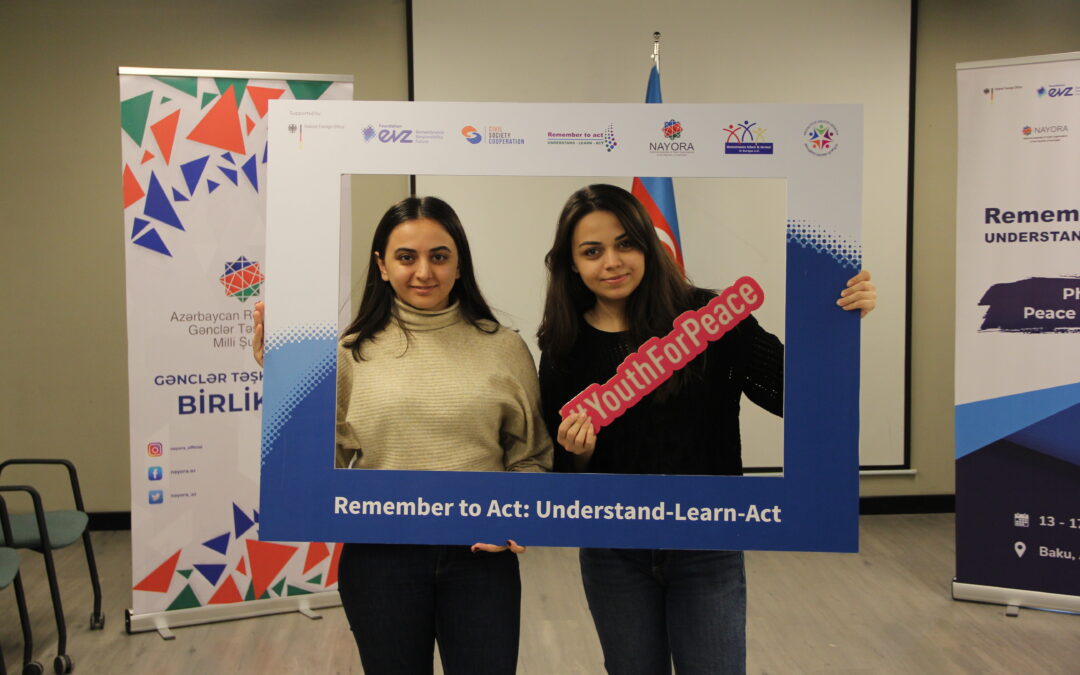By Nazrin Suleymanova, Young European Ambassador, volunteer, and the Azerbaijani participant of the “Remember to Act: Understand – Learn – Act” project
My participation in the peace education activities in Baku was a very educational, fascinating, and memorable experience. Since it was my first time taking part in an offline international project, I learned a lot of new things, including breaking some stereotypes and exchanging ideas with foreigners. I also discussed topics from various perspectives and learned a lot about new cultures. I broadened my horizons and understanding of peace, realized the value of peace education, and learned why it is important to uphold values like trust, empathy, and cooperation with others. During this time, I also expanded my knowledge of project planning and implementation techniques.
What Did I Learn about Peace Education?
One of the most crucial things I discovered was the onion model, which helped me to realize that fewer pointless conflicts would arise if parties could recognize the differences between their needs, interests, and positions. Additionally, I learned a lot from the ABC Triangle model, in which the trainer explained the differences between visible and invisible conflicts and how they affect our daily lives. I was aware that other conflict types would diminish if cultural conflict decreased and our beliefs about certain things changed. The game „Win as much as you can“ was the most intriguing to me because it helped me learn to look at the big picture rather than just one aspect. I learned the value of a cooperative approach to resolving disputes and promoting peace.
What Surprised Me about the Sessions?
I was genuinely surprised during the „Win as much as you can“ game and the one in which we attempted to win our opponent over by employing various strategies. Why? For instance, I observed how my „I must win“ attitude changed in the „Win as much as you can“ game with collaboration and compromising strategy as a result of regular discussions with other groups. And I discovered that making compromises occasionally doesn’t always mean losing and taking the easy way out, but rather demonstrating strong values of cooperation and mutual trust. In a different game, I made my opponent some tempting offers to convince her to join my team. Up until the trainer explained the game, I believed I was competing, but since my offers also benefited the opposing team, it was really a collaboration. Thus, discovering Thomas Killman’s four main strategies was a different learning experience for me.
My Interaction with Other Participating Countries
I talked to participants from other nations during games, coffee breaks, and after trainings. I learned a lot from them as we exchanged opinions and knowledge. I broadened my perspectives in terms of cultures, connected with people on a variety of topics, and had interesting conversations. During those five days, I appreciated the opportunity to make new friends and learn from their experiences.
How Will This Experience Affect My Future Initiatives?
I am sure I will continue my education of peace in the near future, and also share what I learned during this session. I will always try to prefer a collaborative approach to disputes and conflicts and promote trust, empathy, friendship, and mutual understanding in my society. I am also planning to write some blogs about each session I participated in and make other people also learn about peace education.
My Message About Peace
“When there is peace there is harmony and it is the only way to go forward to your goals in this life.” This is a quote that I came up with during the closing session of the quote gallery. I really enjoyed it when we, the participants, read famous quotes one at a time and then discussed them together. I felt very motivated and inspired. In general, I believe that peace is the only real path to happiness and the best course for the future. As members of the human race, we must constantly uphold the values of peace and develop corresponding abilities, such as active listening, self-assurance, sound judgment, and effective leadership. I firmly believe that the ideology of total peace will prevail in the world one day if we members of communities work on it.

